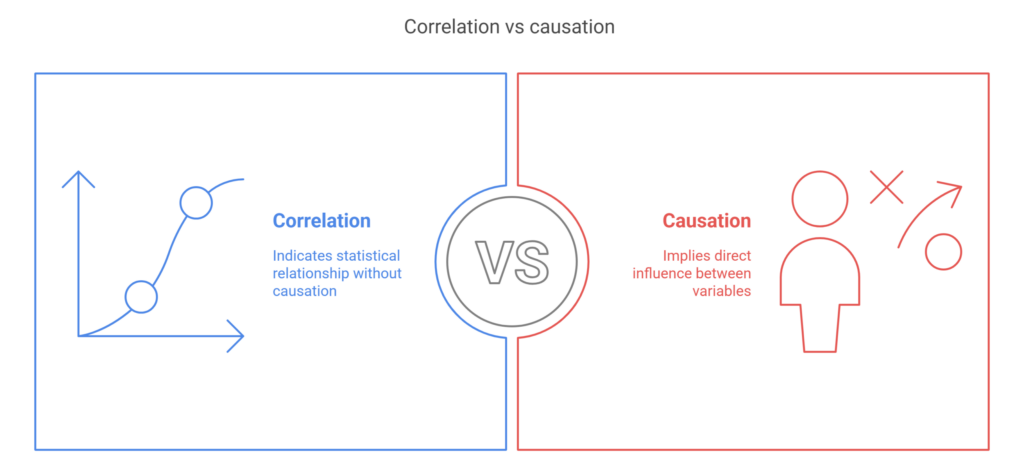Difference Between Correlation and Causation
Understand the difference between correlation and causation with expert guidance for accurate, evidence-based data analysis
At Research Data Experts, we help clients distinguish between inferential relationships that appear connected, and those that are truly cause-and-effect; ensuring that your conclusions are statistically sound and evidence-based. In this webpage, we answer: What is the difference between correlation and causation examples?
What is Correlation?
Correlation refers to a statistical relationship between two variables. When two variables are correlated, it means that changes in one variable are associated with changes in another. However, correlation does not imply that one variable directly causes the other to change.
Types of correlation:
- Positive correlation: Both variables increase or decrease together. i.e. an increase in one variable is matched by a corresponding increase in the other and vice versa.
- Negative correlation: As one variable increases, the other decreases. i.e. there is an inverse relationship between the variables.
- No correlation: No discernible relationship between the variables in question
Correlation vs causation example funny: An intuitive example to understand correlation is ice cream sales corresponding to more shark attacks. Both these incidents may increase in the summer – as more people buy ice cream and also go to the beach, but one does not cause the other (that would be an absurd conclusion). The real factor is the warmer weather – a third variable.
What is Causation?
Causation, or a causal relationship, implies that one variable directly influences or causes a change in another. Establishing causation typically requires more rigorous methods, such as controlled experiments (with treatment and control groups), longitudinal studies examining a population over time, or advanced statistical modeling.
An example of a causal relationship would be smoking and lung cancer. Scientific evidence over time has supported a causal relationship, where smoking increases the risk of developing lung cancer.

Why does this Distinction Matter?
Misinterpreting correlation as causation can lead to wildly misleading claims in your research or in the media. In a more practical sense, it can also lead to faulty decision-making in policy, and result in wasted resources on ineffective interventions. Therefore, understanding the distinction between the two is critical. In essence, correlation does not imply causality.
At The Research Data Experts, we can guide you through designing your research for correlation or causation, conducting the analysis, applying methods like regression, path analysis, or controlled comparisons to uncover causal links, and proper interpretation and discussion of your findings.
How We Can Help: Correlation vs. Causation
Whether you’re working with observational data or experimental results, our team of experts ensures:
- Accurate correlation analysis using Pearson, Spearman, or Kendall methods.
- Careful distinction between association and causation.
- Thoughtful interpretation supported by research design and statistical validity.
Let us help you draw the right conclusions from your data. Reach out today to get expert support on analyzing for, and understanding, correlation and causation in your research.
Talk to us via email info@theresearchdataexperts.com or simply click the “Let’s Chat!” banner below to talk to one of our customer experience agents.
